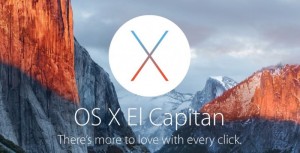Apple releases OS X El Capitan and iOS 9
At the end of September, Apple unveiled its latest iteration of operating systems for Macs, iPhones, and iPads. While Apple touts that the new operating systems will increase performance and bring about other significant improvements, there are reasons why you might want to hold off on upgrading to the latest platform. Read on for an overview of the two platforms and why Campus Technology Support recommends that you do not upgrade until a patch has been released.
Apple unveiled its latest iteration of operating systems for Macs, iPhones, and iPads. While Apple touts that the new operating systems will increase performance and bring about other significant improvements, there are reasons why you might want to hold off on upgrading to the latest platform. Read on for an overview of the two platforms and why Campus Technology Support recommends that you do not upgrade until a patch has been released.
OS X El Capitan for Apple computers
OS X 10.11 El Capitan came out September 30, but was introduced at the Worldwide Developers Conference earlier this year. The new operating system builds on features and design changes introduced in OS X Yosemite. According to MacRumors, Apple’s design of El Capitan focused on two major areas: user experience and performance. Additionally, El Capitan revamped Mission Control (which allows users to organize windows and apps on multiple screens), introducing a new Split View feature that mirrors the iOS 9 Multitasking feature. Apple also upgraded the Mail app, Notes, Photos, Safari, Maps, and two-factor authentication.
iOS 9 for mobile devices
Apple’s latest operating system for iOS devices like the iPhone and iPad was released on September 16. iOS 9 builds on content introduced with iOS 7 and iOS 8, bringing subtle design changes, refined features, improved functionality, and performance enhancements. The platform’s biggest focus is intelligence and proactivity, allowing iOS devices to learn user habits and act on that information. The sometimes loved, sometimes loathed Siri is at the heart of iOS 9 changes. The new operating system grants Siri the ability to create contextual reminders (e.g., reminders based on incoming information from texts) and offer Siri Suggestions. Apps that received major updates include News, Notes, Maps, Mail, Health, CarPlay, and Apple Pay. Finally, Apple has described iOS 9 as being more intelligent, due to the integration of Proactive Suggestions. Proactive Suggestions are system-wide and work in a myriad of ways, offering the user app suggestions and other recommendations at appropriate times.
Think before you upgrade
As with all new operating systems, you might not want to jump on the upgrade bandwagon immediately. Historically, Apple has been plagued with issues upon the first release of a new operating system. When OS X Yosemite was released, many people experienced issues with wireless connections, Bluetooth capabilities, and emails. Some users also reported that their devices crashed while trying to load graphics or webpages.
Prior to upgrading, you should first make sure your device is compatible. At the launch of iOS 9, a significant number of Apple Inc. customers reported that their mobile devices crashed after attempting to load the new operating system. Many of the reports stemmed from people using older models of Apple iPhones and iPads.
For OS X El Capitan, the following Mac computers are compatible:
- iMac (Mid 2007 or newer)
- MacBook Air (Late 2008 or newer)
- MacBook (Late 2008 Aluminum, or Early 2009 or newer)
- Mac mini (Early 2009 or newer)
- MacBook Pro (Mid/Late 2007 or newer)
- Mac Pro (Early 2008 or newer)
- Xserve (Early 2009).
For iOS 9, any device that could run iOS 8 (iPhone 4s and later, iPad 2 and later, and all iPad mini models) are compatible.
As always, the Technology Service Desk recommends that users do not immediately upgrade to new operating systems. University-owned equipment should not be upgraded, since we cannot guarantee the resolution of issues generated by upgrading. The safest policy is to delay upgrading until Apple releases the first or second patch (e.g., OS X 10.11.01 or iOS 9.0.1). These patches usually eliminate the most debilitating issues caused by a new release.
If you have further questions about upgrading your Apple device, contact the Technology Service Desk at servicedesk@elon.edu.
 Follow
Follow